‘More weapons, more visas’: Thousands gather in London to protest about invasion of Ukraine
Multi-national rally in centre of capital calls for more visas for Ukrainian refugees
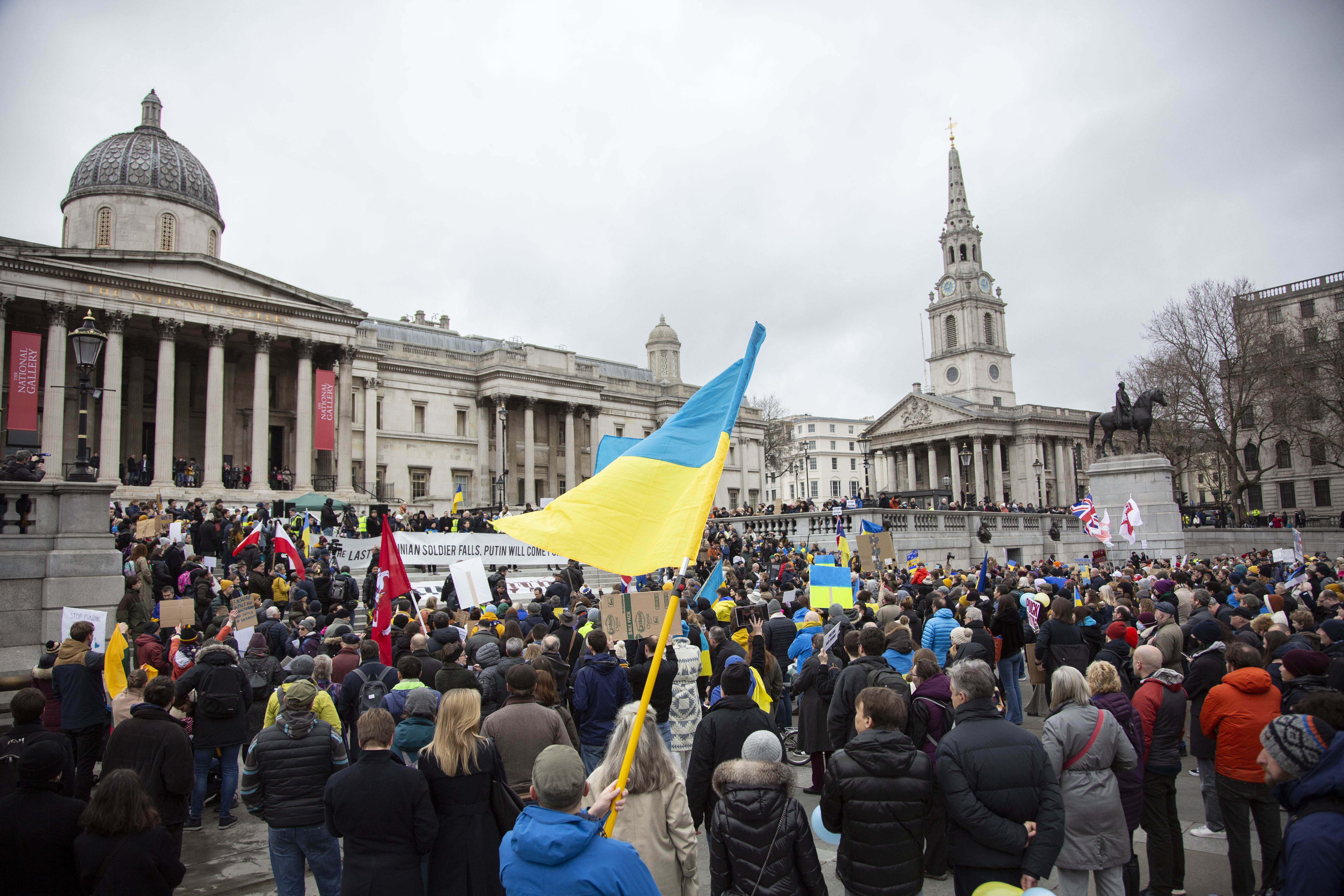
An hour before she stood in a rainy Trafalgar Square demonstrating against the Russian war in Ukraine, Angelina Kopachevskaya was on a call to her mother and grandma in a basement in the bombarded city of Kharkiv.
“They are being super-brave,” the 32-year-old said. “But they not sleeping, they are running out of food, my grandma’s medicine is running out. All they are hearing for the last few days is explosions. My grandma – she is 78. She doesn’t deserve for this to be happening to her.”
Roughly 2,000 people attended a Stand With Ukraine rally in London on Saturday afternoon and, among them, there were countless such stories of heartbreak: of families cowering beneath ground, of cousins preparing to fight on front lines, of men debating if they themselves should leave happy lives in the UK to go and defend the homeland.
“I cannot believe this is happening in 2022,” said Ms Kopachevskaya, who has lived in London for seven years. “It doesn’t feel real. My grandmother in a warzone? How can that be? I speak to them and I can hear shells exploding.”
Her Spanish husband said he had suggested her family should consider leaving several weeks ago when Russian president Vladimir Putin first started moving troops onto Ukraine’s borders. “But they never thought he would really invade. Neither did I. Even with all the troops there, they thought this is not possible. It is barbarism in Europe.”
She felt especially hopeless because she had also been speaking to her brother who works in Moscow. “He says that no one there believes what is happening,” she said. “They say Putin is liberating Ukraine. They say the soldiers are heroes. How can this be stopped if people are brainwashed?”
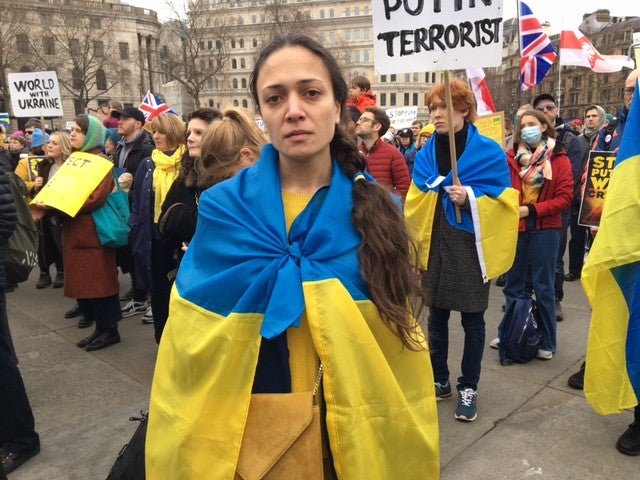
The rally itself was a multi-national sea of blue and yellow. Demonstrators waved flags – Ukraine and Union Jacks mainly – held up homemade placards, and sang slogans. They repeatedly made three clear demands of the UK and western governments: more weapons for Ukraine’s fighters, more visas for the war’s refugees, and the implementation of a no-fly zone over the country to stop Russian warplanes acting with impunity.
But they also warned that Putin would not stop, even if he conquered Kyiv; that a wider war, one way or another, was bearing down on Europe.
“When the last Ukrainian soldier falls, Putin will come for you,” read one massive banner. Another echoed a similar theme: “It was ‘just Poland’ in 1939.”
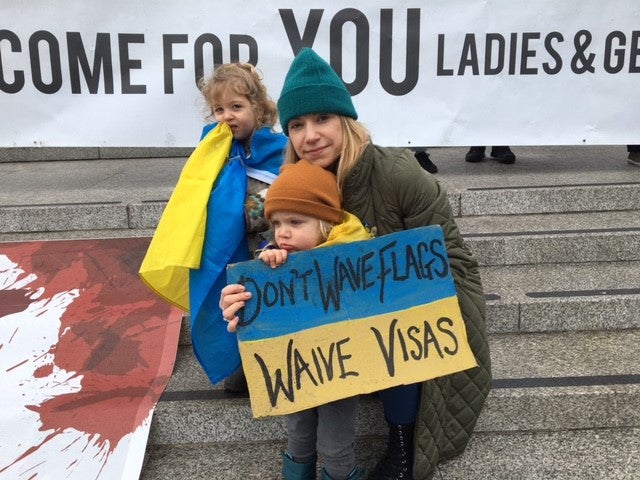
For Chrystyna Chymera-Holloway such history hung heavy in the air.
The 37-year-old charity worker was born and bred in West Yorkshire after her Ukrainian grandparents moved to the UK during the Second World War – but she had never forgotten a story her grandfather told about being given a blue and yellow ribbon in occupied 1930s Ukraine.
“He was only 10 or so but he had to hide it because it was so dangerous to have,” she said. “Now, it’s 90 years later and I have cousins there who could be in the same situation. It is just unbearable.”
She had brought her two children – four-year-old Mila and two-year-old Teodor – to the demonstration. “It was the Nineties before my grandparents went back to Ukraine because of the Soviet occupation,” she said. “Now, if [Russia occupies]… how long will it be before my children can visit? Ukraine is their country. It can’t just be taken from them.”
The family, in fact, were due to visit in February to introduce Teodor to the wider family after two years of lockdowns had made such trips impossible. Now, she said, some of her cousins were joining the front lines. “What if they never get to meet him?” she asked helplessly.
She was, she said, very much in favour of Nato implementing a no-fly zone over Ukraine. Even if that meant risking a nuclear war? “Yes,” she said simply. “Ukrainian children are dying.”
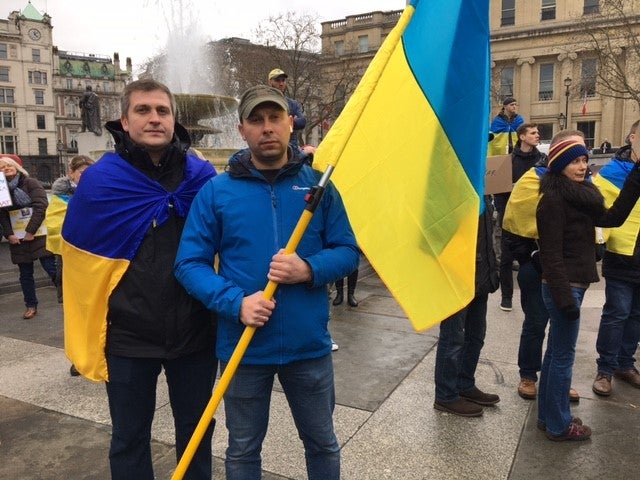
It was a thought echoed by Voldymyr Svitlyk and Igor Rotko. The two friends – both 42 – left Ukraine for London more than 20 years ago. But, now, both of them – each one a father-of-two – had been thinking about returning home to fight.
“I do not think I would be much use as [a fighter],” said Mr Rotko, a chef by profession. “I have no military training. For now, I think I can be of more use here raising money, helping with logistics, these sorts of things. But if it comes to it, yes, I would go. I would be fearful but I would go. Because it would be the right thing to do.”
It may, he admitted, be easier said than done.
“My wife knows I’m serious,” he said. “This is why she has hidden my passport.”
It was not just Brits and Ukrainians here, it should be said. Latvians, Estonians and Lithuanians all appeared to be heavily represented, along with Poles, Italian, French, Lebanese and Brazilians. There were also a spattering of Russians.
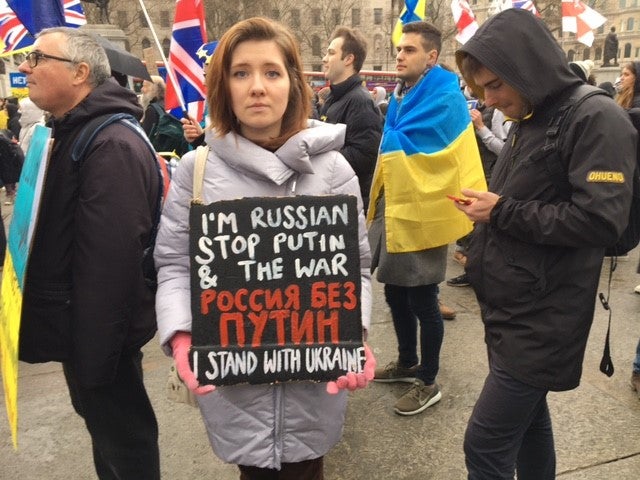
Katja did not want to give her full name because she feared potential reprisals against her family back home in Mordovia – but the 22-year-old held a sign openly declaring her nationality and saying she stood with Ukraine.
“I am ashamed,” she said. “I am angry this is being done in the name of people I love. It is unforgivable; murder and human rights violations committed by Russians.”
Like Ms Kopachevskaya, she too had been speaking to her family just a few hours before arriving in Trafalgar Square. “My grandma, she is a Putin supporter. She says they are only targeting terrorists. I send her pictures – she says these are lies.”
How does that make her feel? “I love her,” she said. “But I don’t know how things can ever be the same again.”
Things, in fact, may never be the same for all of us, according to some here.
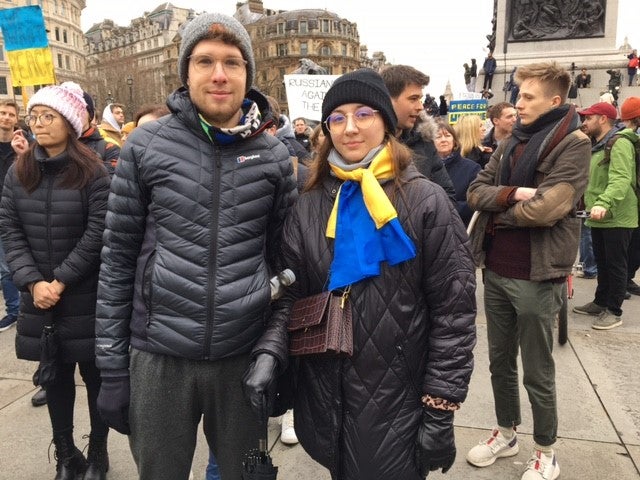
Monika Ciesielska is Polish and has lived in London five years but she has now found herself thinking up contingency plans for her family back home in Wroclaw for if Russia should turn its eyes on Warsaw next.
“This isn’t implausible anymore,” the 25-year-old business analyst said. “I don’t think everyone in the UK understands the seriousness of what is happening. That is why there are only a couple of thousand people here today. It feels far away and too abstract but this is a war in Europe. We cannot look the other way.”
Join our commenting forum
Join thought-provoking conversations, follow other Independent readers and see their replies
Comments
Bookmark popover
Removed from bookmarks